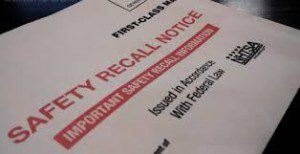 Recalls have little to no impact on residual values, study says
Recalls have little to no impact on residual values, study says
In a study by Black Book Lender Solutions, it found that recalls have almost no effect on vehicle depreciation rates. Even widespread recalls with major press coverage had little to no effect on residual values, which represent the value of a used vehicle.
“Historical data trends have shown that recalls typically do not adversely impact normal retention patterns of a vehicle, immediately after the recall is initiated as well as into the future,” Black Book said in the study.
Lenders use projections of residual values to estimate how much a leased vehicle will be worth when the lease ends. Residual values also come into play if a lender has to repossess a vehicle and then sell it at auction.
Recent cases
Black Book examined some of the most famous recalls in recent history, including the 2008-09 Toyota Camry amid allegations of unintended acceleration, the 2000 Ford Explorer amid crashes involving rollovers tied to faulty Firestone tires, and the 2005-07 Chevrolet Cobalts at the center of the General Motors ignition-switch recall.
Black Book found that 2005-07 Cobalt values were relatively unaffected, despite the massive recalls in February and March. In fact, Black Book found that the value of the 2005 and 2006 Cobalt increased 1 percent in the first six months of 2014.
While Toyota Motor Sales U.S.A. Inc. suffered a drop in sales during the unintended-acceleration recall of the 2008-09 Camry, the recalled vehicles nonetheless depreciated at a slower rate than the average for the segment.
“Toyota had a reputation as an automaker who built vehicles buyers could rely on,” said Larry Dixon, a senior manager of market intelligence at NADA Used Car Guides.
In this case, Toyota’s stellar reputation worked against it, as consumers with high expectations were disappointed by the recall.
Reputation matters
“If an automaker has a reputation that wasn’t quite as sterling, a recall event would have less of an impact on used-vehicle prices,” Dixon said.
He cited an automaker’s reputation as an important factor, which is why Toyota was hit a little harder than other automakers during the unintended-acceleration recall.
At the end of February 2010, about three months into the recall, the depreciation rate for the 2008 Camry was 3 percent, Black Book said. In contrast, the depreciation rate for the 2008 upper midsize sedan segment as a whole, where the Camry competes, had a 3.5 percent depreciation rate.
The 2009 Camry’s depreciation rate at the end of February 2010 was a little higher, at 3.6 percent, but that was still lower than the 2009 upper midsize segment’s 3.9 percent depreciation rate.
Explorer evidence
Ford posted sales gains on the Explorer during the recall of 6.5 million Bridgestone-Firestone tires on the SUV in the summer of 2000, according to the study. The automaker sold 40,157 Explorers in August 2000, up from 39,000 the previous August, Black Book said.
According to the study, a 3-year-old Explorer depreciated at a rate of 2.7 percent from September to November of 2000, while a 3-year-old Explorer in the same period a year earlier depreciated at a rate of 6.3 percent.
While the recalled cars covered in Black Book’s study were not adversely affected, it is important for lenders to understand the details of a recall, including vehicle age, before making decisions, Dixon said.
If the vehicle is older, “price will probably be less affected. Vehicle age has a lot to do with it,” he said. “Lenders need to be cognizant of any ingredients in a recall event.”
Article by Nora Naughton for Automotive News, August 22, 1014
You can reach Nora Naughton at nnaughton@crain.com.

